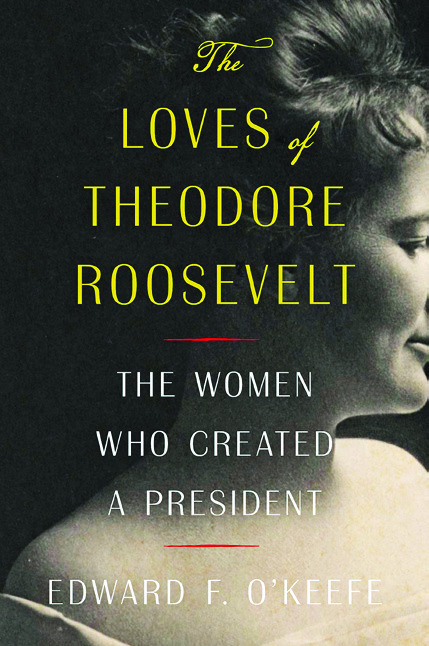Is it really better to have loved and lost, rather than to never have loved at all? Ask your average teenager and the answer would be a resounding and emphatic “no.” As an adult, though, Alfred, Lord Tennyson’s words likely have a wider meaning. In the game of love, you win some, you lose some, and in the new book “The Loves of Theodore Roosevelt” by Edward F. O’Keefe, your position in life matters not.
Though he later had a reputation for adventure and derring-do, young Theodore Roosevelt was soft-hearted and gentle. His many illnesses may have had something to do with that; as an infant, he suffered from “cholera morbus” and other maladies; as a young boy, he took to his bed from many afflictions. Because he wasn’t rough-and-tumble like other boys, he had few playmates other than his siblings: oldest sister Bamie, younger sister Conie brother Elliott, and a “bonus sister,” Edie Carow, who lived nearby.
In later years, Conie (who was the same age as Edie) would say that Edie and “Teedie” seemed destined to be together. When the Roosevelt family embarked on a trip to London, Teedie cried upon leaving his friend. He wrote Edie long letters while he was away at Harvard. He named his boat after her.
Alas, says O’Keefe, on Aug. 22, 1878, something happened between them, maybe a marriage proposal that Edie wasn’t prepared to accept. Roosevelt headed back to Harvard, brokenhearted, but not for long: Not two months later, he met Alice Hathaway Lee.
Much has been written about Valentine’s Day of 1884, and the losses Roosevelt sustained. After the funerals, Roosevelt did what he always did: He left his home and threw himself into action — leaving behind a baby daughter and grieving families.
But he kept in touch with family, and in the fall of 1885, he was in New York, visiting with his daughter and Conie, when Edith Carow came to call. Accidentally or on purpose, the former crushes came face-to-face and “… within forty days of their reunion, they became secretly engaged.”
Chances are, if you know anything about our 26th President, you have an image of a manly man, the hunting- camping-horseback type. He was like that, yes, but in “The Loves of Theodore Roosevelt,” you’ll see a surprisingly marshmallowy TR.
Indeed, author Edward F. O’Keefe presents evidence that Roosevelt had a downright soft side, and could actually be almost floral in his emotions. O’Keefe shares letters written by the future president that practically ooze with Victorian emotion, which knocks any old image you might have aside. Forget all that Rough Rider stuff; Roosevelt was a mushy romantic at his core, and while he did hold some typical late-19th-century attitudes about women and race, he was also quite progressive, which is another pleasant shocker in this very fine book.
Obviously, this is a good tale for history fans and those who like unique biographies, and romance readers may find what they crave in it, too. Try “The Loves of Theodore Roosevelt,” and you’ll love it, too.
— The Bookworm Sez


